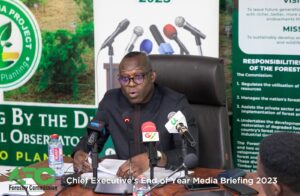Ghana Forestry Commission to seek permission from CITES Secretariat to export rosewood in 2024

The Forestry Commission in Ghana says among other things, that it will seek permission from the Convention on International Trade in Endangered Species of Wild Fauna and Flora (CITES) Secretariat to resume the export of rosewood in 2024.
The CITES Secretariat on June 8, 2022 announced the immediate suspension of international trade in rosewood from West Africa. The ban affected all countries in West Africa as well as Cameroon and the Central African Republic.
Before the ban was imposed, there was a rise in illegal felling and export of the highly sought after tree species in West Africa. According to the Environmental Investigation Agency, as of April 2022 over three million tons of rosewood amounting to $2 billion had been illegally traded between West African counties and China over a five-year period. Sierra Leone, The Gambia, Mali, and Ghana were identified as the top exporters.
And while Ghana had repeatedly announced bans on the illegal harvesting and export of rosewood in in the country, between March and December 2019, more than 147,000kg of rosewood left Ghana to China.
Chinese customs trade data showed that 147,760,190kg of rosewood with a value of $87,628,864 was imported from Ghana into China from March to December 2019.
In December 2019, available data showed that 7,941,771kg of rosewood with a value of $5,368,120 was still being imported from Ghana by China, the Director of Forests Campaign of the EIA, Lisa Handy told Ghana Business News in 2020.
Speaking at a press briefing in Accra recently, Mr Nyadia Sulemana Nelson, the Deputy Chief Executive of the Forestry Commission, said that in 2024, among other things, the Commission plans to submit Legal Acquisition Findings (LAF) for Rosewood to the CITES Secretariat in Geneva and obtain approval for rosewood quota.
The CITES explains LAF to mean a legal requirement that a Management Authority shall make which refers to the export of any specimen of a species included in Appendix I, II or III of the Convention. Rosewood is designated under Appendix II.
Mr Nelson also said the Ghana Wildlife Resources Management Bill 2022, which seeks to boost ecotourism, job creation, and economic growth, is awaiting Presidential assent.
He said the Bill sought to revise and consolidate all laws relating to wildlife and protected areas to conform with existing policies and emerging trends in the natural resources sector and ensure the effective implementation of international conventions on wildlife.
He added that the Bill also seeks to attract private investments into the establishment and management of zoos and private wildlife sanctuaries and give legal backing to local communities in wildlife management through the creation of Community Resource Management Areas (CREMAs).
“The private sector has already demonstrated interest in participating in the development of the sector, and since the government cannot do it alone, we need to create the enabling environment to attract the necessary private investments into the sector, with a strong regulatory framework,” Mr Nelson said.
He also said Ghana has great potential in ecotourism, with abundant resources that it could harness to become one of the major ecotourism destinations in the world.
On his part, Richard Gyimah, the Director for Stakeholders, Ecotourism, and Wildlife at the Commission, explained that private participation in the wildlife sector in establishing zoos and wildlife parks would be in partnership with the Commission.
“We always say the private sector is the engine of growth, so this is another area we have identified that the private sector can partner with the government to induce growth in the country. Already, we have been partnering with some private operators, but the law provides the legal backing to deepen that,” Mr Gyimah said.
Mr Gyimah believed private investment would expand the subsector and create more jobs for tour guides, zookeepers, rangers, and the entire hospitality industry, adding that private participation would also provide access to more wildlife species for researchers and academic institutions and boost ecotourism in Ghana.
He said private sector participation would also help bring ecotourism in Ghana to international standards and generate more tourism revenue and foreign exchange.
Citing statistics, he said the sector has seen remarkable growth in activities, especially after the end of the COVID-19 pandemic.
From 300,000 visitors to ecotourism sites in 2022, the number increased to nearly 400,000 in 2023, and the Commission aims to attract at least 500,000 visitors in 2024, he said.
He added that the visits generated GH¢4.5 million or $374,000 in 2022 and GH¢6.0 million or $499,000 for the Commission in 2023.
In 2024, the Commission plans to supervise the successful completion of reclamation and revegetation activities in mined-out sites within the Denyau Shelterbelt, Supuma and Afao Hills Forest Reserves, submit Legal Acquisition Findings (LAF) for Rosewood to CITES Secretariat, Geneva and obtain approval for Rosewood quota and a $7 million funding for private plantation development as well as cut sod for Koforidua Zoo project.
By Emmanuel K Dogbevi, with additional files from the GNA
